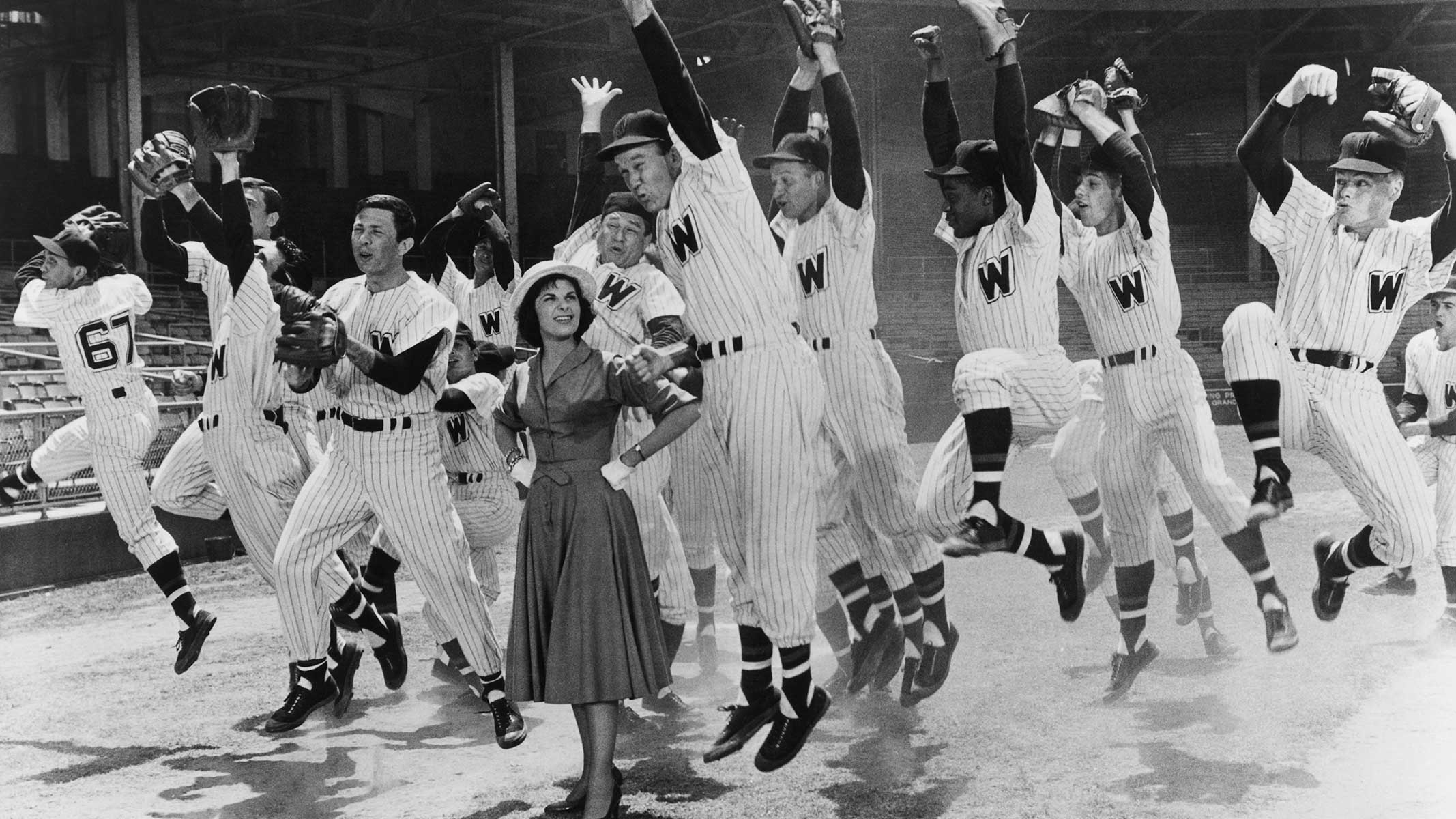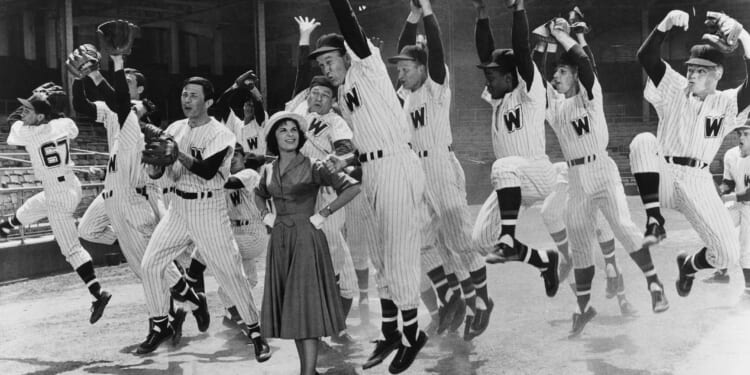
“A cheap gringo with halitosis” is the racist description that Lola, an eternally youthful 350-year-old seductress, applies to her infernal master in Tony Award-winning director Sergio Trujillo’s revival—or as he calls it, his “revisal”—of Damn Yankees. Richard Adler and Jerry Ross’s Faustian 1955 musical opened in its new form at Washington, D.C.’s Arena Stage last month. There is already talk of it traveling to Broadway next year.
The production lurks in the shadows of the recently reformed John F. Kennedy Center for the Performing Arts, the multistage federal arts complex across town. President Trump earlier this year became chairman of the Kennedy Center’s board after replacing many of its Democrat-appointed members with close supporters.
Finally, a reason to check your email.
Sign up for our free newsletter today.
The transformation—which has seen the withdrawal of radical identity politics content in favor of more traditional works—has sent shockwaves through Washington’s small but proud arts community. Responses range from angry denunciations to bizarre interpretive-dance displays to sullen silence. Arena Stage has long affected a progressive edge, but its Damn Yankees cannot be read as anything other than an attempt to defend DEI on stage against Trump’s assault.
Based on Douglass Wallop’s 1954 novel The Year the Yankees Lost the Pennant, Damn Yankees tells the tale of Joe Boyd, a frustrated, unhappily married middle-aged Washington Senators fan who makes a deal with an American incarnation of the devil who calls himself “Applegate.” In exchange for Joe’s soul, Applegate transforms him into Joe Hardy, a fit young man with the athleticism to lead the Senators to victory over the championship-holding Yankees. Before Joe can triumph, the devil summons Lola to distract him from victory, hoping Joe will lose both the crucial game and his soul. He resists and breaks the devil’s curse by reclaiming the true love of his frumpy but devoted wife Meg.
The Faust legend remains a familiar one in our culture, yet Damn Yankees has fallen off. No major revival has appeared for more than 30 years—a generational lapse correlating to baseball’s declining popularity. The show’s plot is in any case anachronistic: the perennially ill-fated Senators left Washington for good in 1971, leaving the city without a baseball team until the Nationals came along in 2005. The Nationals joined the National League, which took them out of direct contention with the Yankees, thus rendering the show’s rivalry impossible.
Baseball had broken the color barrier by 1955, but it was still overwhelmingly white, as were the characters and cast of the original show. The women—Lola, Meg, and Gloria, a female sports reporter—are thinly drawn. “The Game,” one of its most evocative ensemble numbers, describes women (“broads” in the original lyrics) in ways that could today raise “uncomfortable” questions about consent.
None of this stopped the original production from winning seven Tonys, including Best Musical, and running for more than 1,000 performances. Its historic success appears to have constrained Arena Stage to describing its revival as “gently retooled.” The retooling was apparently so gentle that Will Power, Doug Wright, and Lynn Ahrens spent five years coming up with a DEI-infused new book for it. Trujillo, who choreographed as well as directed the new show, says “we have to look at it through the lens of today” and create an atmosphere “that reflects what America should be.”
What “America should be” apparently existed in the year 2000, with all the principals recast as minorities, except for Applegate—the devil—who remains white. Washington was still without a baseball team in that year, so Joe is a black Baltimore Orioles fan whose father was denied a Major League career because of his race. Lola is a Latina whose beauty and dancing talent—impressively deployed by Ana Villafañe—was Applegate’s poisoned gift to escape rural poverty.
Throughout the show, it’s hard to escape the conceit that whites are evil oppressors who resort to trickery, legalism, technicalities, and, ultimately, force to exploit disadvantaged people of color. The lyrics of “Heart,” the show’s signature tune, reflect not the morale that the losing team needs to win (“You gotta have heart!”), but the fortitude that the minorities courageously muster to confound Applegate’s diabolical white male oppression.
In a reminder of the show’s politics, Applegate—played with alacrity by Rob McClure—recounts a recent disappointment collecting souls at a certain “political convention” in Philadelphia. All the men’s souls, he says, had already long been sold. (Recall that in 2000, Philly hosted the Republican National Convention.)
Gloria, the original show’s busybody sportswriter, has a gratuitous but mercifully brief “trans-friendly” monologue about having always felt a little bit different from the girls she grew up around. Meg, believing Joe has abandoned her, entertains clichéd feminist musings on finding fulfillment without him.
Lola comes to see value in Joe’s principles, abandons her existence in the devil’s thrall, and both fails to give Joe the doping drugs and encourages him to return to Meg. Applegate sends her to hell for her disobedience—and what white male wouldn’t?
The political overtones are unfortunate, as the performance was superb. Trujillo’s choreography lacks the elegance of Bob Fosse’s original, but it is vigorous and demanding, with flips and leaps for the ensemble. Lola is no mere strip tease but a vivacious and self-assured Latin dancer who disrobes Joe as much as herself to the happily unchanged lyrics to “Whatever Lola Wants.” Adam Rothenberg drew a classic big band sound from the company’s live orchestra, reminding us that classics are best left classics.
Still, it’s hard not to conclude that Trujillo’s implied rebuke to Trump’s Kennedy Center takeover falls flat. Doubling down on the politics may make Washington’s artist class feel superior. But the stark contrast between the quality of Damn Yankees’ production and the clumsiness of its message shows that Trump is right: time for the theater to get back to being theater.
Photo: John Springer Collection/CORBIS/Corbis via Getty Images
City Journal is a publication of the Manhattan Institute for Policy Research (MI), a leading free-market think tank. Are you interested in supporting the magazine? As a 501(c)(3) nonprofit, donations in support of MI and City Journal are fully tax-deductible as provided by law (EIN #13-2912529).
Source link

















